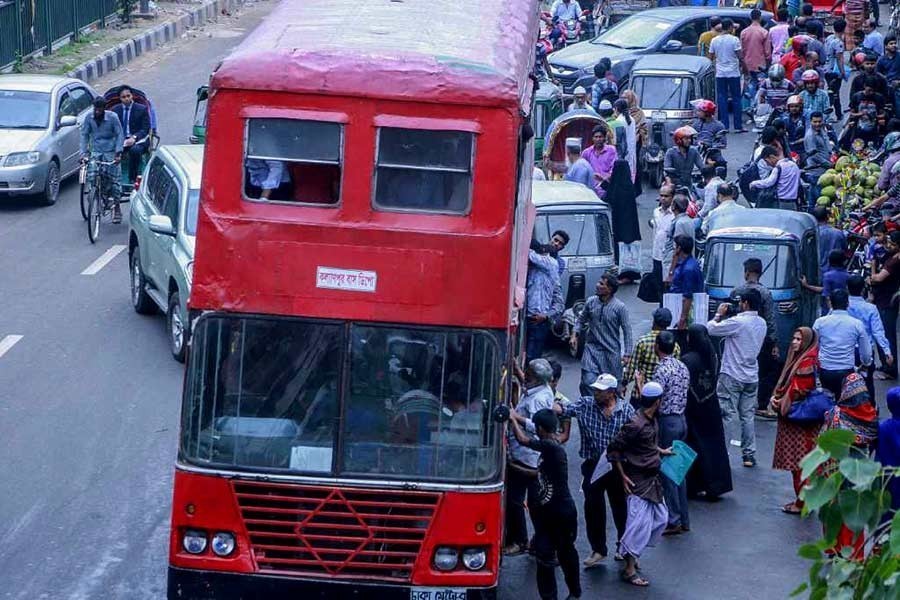
Published :
Updated :

Some serious issues of governance relating to road safety and discipline in transport sector are lost in discussions on accidents and traffic congestions -two more pressing issues.
In fact, the 'Road Transport Act 2018' was enacted in the wake of massive youth demonstration, especially by schoolchildren following death of two students in road crash in Dhaka city in 2018. The law finally comes into effect on November 01, 2019, a year after its enactment, and the delay itself has been a talking point in public debates.
Opinions on commuting in cities or journey through highways are still shaped by concerns over high fatalities in road crashes - 2,529 deaths in 1,764 accidents in 2016, 3,672 deaths in 2,917 accidents in 2017, 4,076 deaths in 3,513 accidents in 2018 and 3,488 deaths in 3,131 accidents so far in 2019, according to Accident Research Institute at the BUET.
In the process, we miss other important aspects of the act, which has replaced 'Motor Vehicles Ordinance 1983' promulgated during General Ershad's martial law regime but its rules will be followed until formation of new ones for enforcing the latest act.
Certain provisions of the new law, if one reads carefully, may create high expectations -- though a normal practice in developed countries -- among the people. But, unless the stakeholders are aware of the relevant provisions of the law, they will not be able to abide by it nor will they be able to seek remedy from the authorities concerned.
For example, the law says, the government shall fix the number of vehicles for entire Bangladesh or for a particular region or area, apart from fixing fares and distribution of seats in public transports.
The law bans extortion [no law allows it though] at terminals or on the highways and both passengers and vehicle owners have reasons to be elated about it. However, it remains to be seen how or how far this provision is enforced. Like the previous law, the new one does not allow movement of unfit vehicles.
Under the new law, traffic movement shall be regulated by determining speed of vehicles and using traffic sign and signal in keeping with a specific method. It's expected that technology will replace manual control of movement of vehicles on city streets.
Unnecessary use of horn is a major nuisance which may be addressed by the law which keeps provision for determining levels of sound created by motor vehicles. In line with the Bangladesh Environment Protection Act 1995, the authorities shall also measure vehicle emission and can cancel their right to ply, if found harmful.
Certain designated authorities, in consultation with the police, will fix spots for parking and stoppage of public vehicles and boarding of passengers. This is definitely a challenging task in a crowded city like Dhaka where footpaths are occupied by others.
As a rule of thumb, use of mobile phone is restricted during driving. So is the provision for drunken driving.
There are provisions for fine for their violation and the amounts of fine are revised upwardly. However, beyond punitive mode, arrangements are yet to be made to train thousands of drivers or build mass awareness about relevant traffic laws. Stakeholders' debates are often limited to Code of Criminal Procedure, as adopted in the law, which makes offences under the law cognizable and in a number of cases non-bailable.
The law has made provision for compensation for families of persons affected by and killed in road accidents and there should be a welfare fund for the purpose.
However, the law keeps the provision for maximum punishment of five years of imprisonment for causing death to a person by reckless driving - a provision which satisfies neither transport workers nor road safety campaigners. Still, proper implementation of the law can not only bring improvement in the situation but also set a good example for the future.


 For all latest news, follow The Financial Express Google News channel.
For all latest news, follow The Financial Express Google News channel.